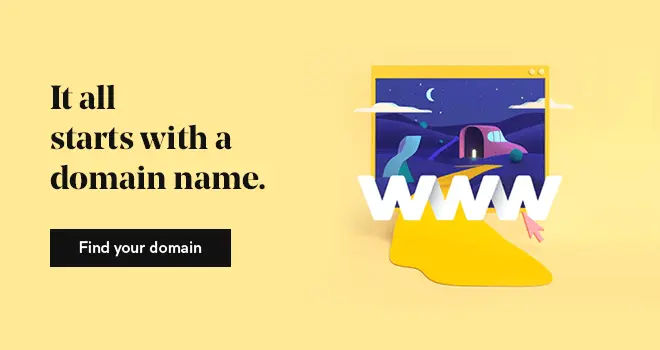In today's digital landscape, having an online presence is indispensable, especially for small businesses in the booming e-commerce sector. With competition intensifying globally, every decision about your online store becomes crucial, starting with the selection of the right domain name and Top-Level Domain (TLD). Your domain name is not just a URL; it's a vital branding tool that influences your SEO and search rankings. For beginners and entrepreneurs, tools like domain name generators can help brainstorm memorable, brandable domain name ideas.
The TLD you choose also plays a significant role in your brand's perception. With options ranging from the well-known '.com' to niche extensions like '.shop,' the choices are vast. Domain registrars like GoDaddy offer tools to help you find the perfect domain name, while hosting providers simplify the technical aspects of setting up your online store on platforms like WordPress or Amazon.
This guide aims to simplify the process of choosing the ideal domain name and TLD for your online venture. We'll explore why the right domain name is crucial, delve into the rising popularity of various TLDs, and offer practical tips to avoid common pitfalls. So, let's embark on this journey to set the stage for your online store's long-term success. With the right choices, you'll capture potential customers' attention and position your business for enduring success.
Why choosing the right domain name matters
So, you're brainstorming some awesome domain name ideas for your new venture, huh? That's super exciting, but also a decision you'll want to give some serious thought to. Why? Because your domain name is like your online street address—it's how people are going to find you and remember you. Let's dive into why this choice is so crucial.
It's all about branding and identity
First impressions matter, right? Your domain name is often the first thing folks will see when they stumble upon your online store or e-commerce business. Think of it as your digital handshake.
While branding has no quantifiable ROI, it is essential for keeping your brand top of mind.
A catchy, brandable domain name not only helps you make a memorable first impression but also tells people what you're all about. On the flip side, a confusing or complicated name might just send potential customers running in the opposite direction. So, let's make sure that doesn't happen!
The SEO game
You've probably heard about SEO (Search Engine Optimization). It's that magical formula that helps your online business show up in Google searches. Well, your domain name plays a part in that magic! Search engines love relevant and keyword-rich domain names.
For instance, if you're running an online pet supply store, a name like "qualitypetpupplies.com" could give you a leg up in search rankings. And don't forget, the domain name extension you pick (like .com, .org, etc.) can also make a difference in how Google sees you.
Trust me, it's important
In the online world, trust is everything. When potential customers find your e-commerce business, a straightforward and brandable domain name can make them feel like they're in the right place. The domain extension you choose can add an extra layer of credibility too. But beware—a confusing or sketchy domain name can raise all sorts of red flags, making people less likely to stick around, let alone buy anything.
Rise of e-commerce in Asia
The e-commerce landscape in Asia is experiencing unprecedented growth, driven by technological advancements, changing consumer behavior, and economic factors. This growth is not just confined to developed markets like China and Japan but is also rapidly expanding in Southeast Asian countries like Indonesia, Malaysia, the Philippines, Thailand, and Vietnam.
Market overview
Asia's e-commerce market is expected to reach staggering figures in the coming years. According to various reports, the market is projected to grow to $1.89 trillion USD by 2023, up from $1.3 trillion USD in 2019.
China remains the dominant player, accounting for a significant portion of the market. However, Southeast Asian countries are catching up quickly, with five of them among the fastest-growing e-commerce markets worldwide. For instance, Indonesia had e-commerce sales of $43.4 billion in 2021, showing year-over-year growth of 32%.
Technological drivers
One of the key drivers of this growth is the rise of mobile commerce. With nearly 100% mobile penetration rates in some countries, consumers are increasingly using their smartphones for online shopping. This trend is particularly strong in China, where mobile commerce makes up a significant portion of e-commerce sales.
Companies are also leveraging technologies like augmented reality (AR) and virtual reality (VR) to enhance customer experience, and Artificial Intelligence (AI) and Machine Learning (ML) are expected to play an even bigger role in the near future.
Changing consumer behavior
The COVID-19 pandemic has accelerated the shift towards e-commerce. As many as 40 million new internet users were added in Singapore, Malaysia, Indonesia, the Philippines, Vietnam, and Thailand in 2020 alone. Consumers are not just looking for products; they are seeking an enhanced shopping experience. Live video shopping and social commerce through platforms like TikTok and WeChat are gaining popularity, offering a more interactive and engaging shopping experience.
Cross-Border E-commerce
Another noteworthy trend is the growth of cross-border e-commerce. Consumers in Asia are increasingly interested in purchasing high-quality products from abroad, providing new opportunities for businesses to expand their reach beyond local markets. This is facilitated by improved logistics and payment solutions, making it easier for consumers to shop from anywhere.
Challenges and opportunities
Despite the promising growth, challenges like poor infrastructure, consumer skepticism, and the need for effective logistics solutions persist. However, companies that are willing to innovate and adapt to the changing needs of consumers are well-positioned to succeed in this booming market.
What is a domain name?

Simply put, a domain name is your website's address on the internet. It's the web address that people will enter into their browsers to find your online store or e-commerce business.
Let's touch on some technical aspects, but we'll keep it straightforward. A domain name consists of different components, one of which is the Top-Level Domain (TLD), also known as the domain name extension. This is the part that comes after the "dot," such as .com, .org, or even country-specific extensions like .uk. These domain extensions serve specific functions; for example, .org is commonly used by organizations, and .edu is designated for educational institutions.
Now, beyond being a web address, a domain name is also a valuable branding tool. A well-chosen, brandable domain can set your online store or e-commerce business apart and make it easier for potential customers to find you. For business owners, it's important to note that your domain name should align well with your brand name, as it contributes to your online credibility and trustworthiness.
So, as you consider various domain name ideas for your online venture, remember that your domain name is not just a functional web address. It's an integral part of your brand and plays a role in how you are perceived online. Choose your domain name thoughtfully.
What is a top-level (TLD) domain?
In simple terms, a Top-Level Domain is the part of the domain name that comes right after the final "dot" in your web address. For example, in "www.YourBusiness.com," the ".com" is the TLD. It's a crucial part of your web address and plays a significant role in your online identity.
TLDs come in various flavors, and understanding the differences can be quite beneficial, especially for business owners. You have generic TLDs like the well-known .com domain name extension, which is open for anyone to register. Then there are more specialized or niche TLDs, such as .blog for bloggers or .shop for online stores. These can make your web address more descriptive and potentially easier for potential customers to remember. Some businesses even opt for brandable TLDs, like .google or .apple, to further align their domain name with their brand name.
Country-code TLDs (ccTLDs) are another option. These are specific to individual countries, like .uk for the United Kingdom or .ca for Canada. If your business targets a specific geographic area, a ccTLD might be the perfect domain name extension for you.
ccTLDs are a powerful way to tell Google which version of your site should be served in specific countries.
Why does your choice of TLD matter? Several reasons. First, it can influence how potential customers perceive your online business. Some TLDs are viewed as more trustworthy or industry-relevant. Second, your TLD can have SEO implications. Search engines do consider TLDs when ranking websites, so choosing wisely could give you an edge.
So, as you continue to explore domain name ideas, remember that the TLD you choose isn't just an afterthought. It's an integral part of your web address that can affect your brand's credibility, search visibility, and even customer trust. Whether you go for a .com extension or something more specialized, make sure it aligns well with your business name and objectives. Choose wisely!
Tips on picking the best domain name for your online store
Choosing the right domain name for your online store is a critical decision that can significantly impact your brand's success, customer trust, and even SEO rankings. Here are some expert tips to guide you in selecting the perfect domain name that aligns with your business goals and resonates with your target audience.
Do your research
Before you even start brainstorming domain name ideas, it's crucial to do some research. This involves multiple steps:
- Trademark Search: Check if the name you're considering is already trademarked by another business. This can save you from potential legal issues down the road. For example, AI copywriting tool Jasper.ai was once known as Jarvis,
- Domain Availability: Use domain name search tools like GoDaddy to see if your desired domain is available. If it's taken, these domain registrars often provide alternative suggestions.
- Competitor Analysis: Look into similar names or variations to avoid any potential confusion with competitors. You don't want your potential customers ending up on a rival's site by mistake.
- Audience Preferences: Research what types of domain names resonate with your target audience. This can provide insights into what they find memorable or trustworthy.
Include targeted keyword for SEO

Search Engine Optimization (SEO) is vital for online visibility. Incorporating relevant keywords into your domain name can give you an advantage in search rankings.
However, it's essential to strike a balance; your domain name should contain keywords but still be easy to read and remember. For example, if you're selling eco-friendly products, a domain name like "ecofriendlygoods.com" could be both SEO-friendly and descriptive.
Keep it short and simple.
Lengthy or complicated domain names can be a hassle for potential customers. They're hard to remember, easy to mistype, and can be confusing. Aim for a domain name that is concise, easy to spell, and easy to remember. The simpler and more straightforward it is, the easier it will be for customers to find your online store.
Attention-grabbing and brandable.
A good domain name should be more than just functional; it should also be brandable and attention-grabbing. Consider the following:
- Uniqueness: Choose a name that stands out from the crowd and isn't easily confused with other brands.
- Emotional Impact: A great domain name can evoke the feelings or experiences you want to be associated with your brand.
- Alignment with Brand Identity: Make sure the domain name aligns well with your overall brand name and the image you wish to project.
Relevance to your business offerings
Your domain name should serve as a quick snapshot of what your business offers. If you sell gourmet coffee, for example, a name like "GourmetJavaShop.com" instantly tells potential customers what they can expect to find. This relevance can also extend to the domain extension you choose; for instance, a .shop or .store extension could be more descriptive for an e-commerce business.
Don't use numerals, "chat speak", hyphens or confusing words.
Avoid elements that can easily be misunderstood or mistyped. Numerals can be confusing when spoken aloud ("Is that '5' or 'five'?"). Hyphens are often forgotten or misplaced, and "chat speak" can appear unprofessional. Stick to clear, straightforward language that won't confuse your audience.
You can't use special characters.
Special characters like &, %, $, and @ are not allowed in domain names. They can be confusing, are prone to typos, and are generally not SEO-friendly. Stick to alphanumeric characters to keep things simple and user-friendly.
Tips on picking the best TLD for your online store
Choosing the right Top-Level Domain (TLD) is a critical step for entrepreneurs and business owners looking to establish a strong online presence. The TLD, or domain extension, you choose can significantly impact your brand's credibility, search rankings, and customer trust. Here's a guide to some popular TLD options to help you make an informed decision for your ecommerce business.
.com
The .com extension is the most widely recognized and trusted TLD, making it the go-to choice for many online businesses. It's often the first extension people think of when recalling a web address. A .com domain name offers a high level of trust and credibility. However, because it's in high demand, you may find it challenging to secure a great domain name that's both short and brandable.
Domain search tools like GoDaddy can help you see if your desired .com domain name is available. This extension is best suited for businesses aiming for a global audience and those who want a TLD that is easily recognized and remembered. Beginners often start with a .com extension due to its widespread recognition.
.co
Increasingly popular among startups and tech companies, the .co extension is often considered an alternative to .com. It's short and easy to remember, making it a good option for a brandable domain.
However, because it's similar to .com, there's a risk of misspellings and typos, which could lead potential customers to a different site. This extension is ideal for startups and tech companies, especially those who couldn't secure their desired .com domain name. Domain registrars often suggest .co as an alternative if your first choice is taken.
.biz
The .biz extension is designed for business use, making it a relevant choice for ecommerce stores. It's less commonly used than .com, so you might have a better chance of getting the perfect domain name for your business.
However, some people view .biz as less professional or even spammy compared to .com, so it may not be the best choice for all entrepreneurs. This extension is often recommended for small to medium-sized businesses and companies in the B2B sector.
.shop
For online stores and ecommerce businesses, the .shop extension speaks volumes, instantly communicating the nature of your business.
Although it doesn't enjoy the universal recognition of .com, it compensates by being highly descriptive. Platforms like WordPress often recommend the .shop extension, but you might need to invest more in marketing to build customer trust.
.online
The .online extension offers versatility for a range of online businesses. It exudes a modern, innovative vibe but might need a marketing push to gain the trust that more traditional extensions enjoy automatically. Particularly suitable for tech-savvy businesses and those operating exclusively online, it's also a fallback for those who couldn't secure their first-choice .com or .shop domains.
.store
Ecommerce businesses find a natural fit with the .store extension. It leaves no room for ambiguity, clearly indicating an online retail operation. While it may not stick in people's minds as easily as a .com, it can be a more descriptive choice, especially for businesses hosted on ecommerce platforms like Amazon.
Conclusion: Secure your online store's future with the right domain and TLD
Choosing the right domain name and Top-Level Domain (TLD) is more than a technical requirement; it's a strategic move that can significantly impact the success of your online store. Your domain name serves as your online identity, a powerful branding tool that can influence everything from SEO to customer trust.
For those brainstorming brandable and memorable domain name ideas, tools like domain name generators can be invaluable. If you're looking for a seamless way to secure your dream domain, GoDaddy offers a one-stop solution for domain registration and web hosting. This simplifies the process for small business owners and startups, making it easier to set up online stores on various platforms, including WordPress and Amazon.
In the ever-competitive world of e-commerce, every detail matters, and your domain name is no exception. It's the first impression potential customers have of your business, and in the digital world, first impressions are often lasting. With careful planning, due diligence, and the right resources, you can avoid common pitfalls like typos, spammy names, and hyphens that could hurt your brand's credibility.
The journey to finding the perfect domain name and TLD may be filled with complexities, but it's a journey worth taking. Your choice will set the tone for your business, influence customer perceptions, and play a role in your long-term success. So take the next step in establishing a strong online presence for your business. Your future in the bustling world of online commerce depends on it. Get your dream online store domain with GoDaddy today!







